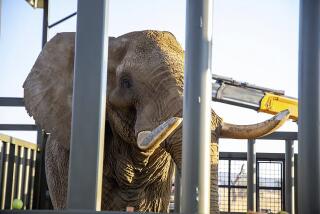Review: Disneynature doc ‘Elephant’ is gorgeous if much too obvious (tusk, tusk)
By sheer coincidence, the new feature-length documentary narrated by Meghan Markle — or as she is billed on-screen, Meghan, the Duchess of Sussex — is about a majestic family whose way of life, though rooted in centuries-old traditions, has never felt more imperiled. That’s probably a misleading way to characterize a herd of pachyderms making their dangerous annual migration across hundreds of miles of parched Kalahari Desert in southern Africa. Or maybe it’s appropriate: After all, “Elephant,” like most of the Disneynature films before it, is not exactly shy about projecting recognizable human motivations onto its animal characters and encouraging us to do the same.
Yes, it’s another film about beloved Antarctic waterfowl, but there are a few features that distinguish Disneynature’s “Penguins” from the colony.
This is not entirely a bad thing, and the movie, which begins streaming Friday on Disney+, emerges a generally charming, sometimes cloying exercise in wildlife anthropomorphism. The English writer-director Mark Linfield has directed earlier documentaries in this vein including “Chimpanzee” and “Monkey Kingdom,” and in the elephant, he has an especially beautiful and remarkably cinematic subject. To some extent, you can read drama and emotion in every gesture, in every slow, regal step and every gentle sway of the trunk.
And so Markle’s warm, insistently upbeat descriptions of the on-screen activity (written by Linfield and David Fowler) can’t help but feel a touch redundant: “It’s time for a pool party!” she declares as the entire herd joyously splashes about in the Okavango Delta, near the end of a much-needed flood season. Once the delta dries up, as it does every year on schedule, the elephants will begin their long trek in search of another lush green oasis. Death from thirst is an ever-present danger as the elephants wend their way from one watering hole to the next, with little room for navigational error. In the movie’s most poignant image, one elephant mournfully caresses a fallen comrade’s bleached-white skeleton with its trunk, as if in grim acknowledgment of the fate that could soon await them all.
Their survival story is full of natural peril and fearsome predators, especially when it leads them on a risky shortcut through lion country or directly into the path of a crocodile ambush. There are lighter, more heartening moments too, like when an enormous bull elephant shakes a high branch, bringing down enough nutrient-rich seed pods for his hungry friends to feed on. Like more than a few nature documentaries, “Elephant” is a beautifully shot, precisely calculated weave of high drama and mischievous hijinks, a highlight reel assembled from what must have been months of patient, relatively uneventful observation.
In the well-worn but inexhaustible genre of the nature documentary, the imposition of a coherent narrative onto patterns of mundane animal behavior is less a compromise than a built-in convention. Even so, it’s hard not to wish that this particular narrative were less manipulated, less prone to making presumptuous, how-exactly-do-you-know-that leaps into the memory and psychology of its subjects. The sight of an elephant pulling a young calf stuck face-down in the mud, rescuing it from near-certain suffocation, is harrowing and heroic enough on its own without the accompanying voiceover sentiment: “Gaia never gives up and will never leave family behind.”
Ah yes, Gaia. That is the name given to the wise and weary matriarch leading her fellow elephants on this months-long mission. She will eventually be succeeded by her younger sister, Shani, who strives to prove herself worthy of the role while looking after her rambunctious 1-year-old calf, Jomo. The impulse to individuate wild animals by name — to transform camera subjects into characters — is understandable enough in the context of a kid-friendly entertainment. It’s also one of several structural and aesthetic choices, the hand-holding narration and Ramin Jawadi’s relentless musical score among them, that can’t help but feel vaguely infantilizing. It’s as if the filmmakers (they include the co-directors Vanessa Berlowitz and Alastair Fothergill) thought we could only care about these marvelous animals if we saw them as extensions of ourselves, if they were served up in the most relatable, emotionally palatable way possible.
That push for palatability probably explains why some pertinent details about the human impact on this fragile environment — from the ongoing slaughter of elephants by poachers throughout Africa, to the susceptibility of these heavily water-dependent creatures to climate change — go conspicuously unmentioned in a film ostensibly designed to educate its audience. These concerns are hardly incidental here; they’re crucial to the work of Elephants Without Borders, a charity to which Disney made a large donation in exchange for Markle’s voiceover fee.
Good for them. Even so, the avoidance of tough truths and political realities, in favor of cute critters and easily digestible uplift, has long been par for the Disney course. Indeed, watching this movie’s opening and closing scenes, with their triumphant music and numerous bird, baboon and antelope reaction shots, you might feel as though you’re seeing a (mercifully CGI-free) outtake from the studio’s recent redo of “The Lion King.” Which you can also watch, of course, on Disney+, one more addition to the studio’s endless content-streaming circle of life.
‘Elephant’
Rated: G
Running time: 1 hour, 26 minutes
Playing: Available April 3 on Disney+
More to Read
Only good movies
Get the Indie Focus newsletter, Mark Olsen's weekly guide to the world of cinema.
You may occasionally receive promotional content from the Los Angeles Times.











